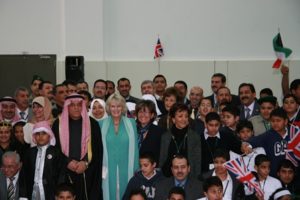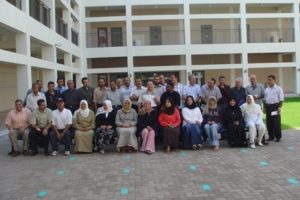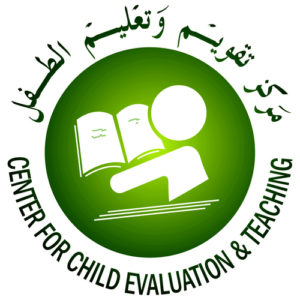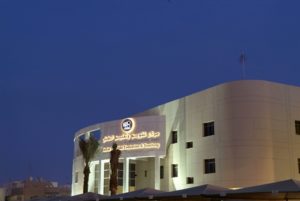February 2013
By Gad Elbeheri, Ph.D., IDA Board Member and Chair of IDA’s Global Partners Committee
CCET, also the Center, was established in 1984 as a non-profit organization (Charity), which according to the Kuwaiti relevant laws, is supervised by the Ministry of Social Affairs and Labor.
Who established the Center?
A group of Kuwaiti mothers headed by Mrs. Faten Al Bader established the Center. It is interesting to note that the late Mr. Charles Drake, who established Landmark School, was instrumental in the shaping of the philosophy of teaching and assessment provided at the Center right from the beginning.
What are the vision and objectives of the Center?
The Center’s vision is to empower individuals with specific learning disabilities to achieve their full potential and be included in the society in which they form a part.
- To champion Inclusion of individuals with learning disabilities,
- To provide professional services that reflect international standards,
- To campaign on behalf of individuals with learning disabilities and their families, and
- To develop resources that facilitate the identification of individuals with learning disabilities, as well as appropriate intervention for their disabilities.
What are the services that the Center provides?
The services are:
- Awareness through its website, lecture series, publication of books and a specialized national helpline and a public library,
- Assessment through the provision of psycho-educational evaluations to the general public (around 400 such evaluations a year),
- Training services and short courses on dyslexia and related language disorders through the Center’s training unit,
- Intervention through a morning and an evening program in collaboration with the Kuwaiti Ministry of Education (Such services are offered in both English and Arabic).
 How has the Center benefitted from being an IDA Global Partner?
How has the Center benefitted from being an IDA Global Partner?
The Center is proud to be a Global Partner of IDA and has benefitted immensely from being a Global partner. Many of the professional consultants and researchers who are affiliated with IDA or who attend and participate in IDA conferences are regular advisors and consultants to the Center. Also, the Center learns from other professionals and from the experiences of similar organizations, both in the US and globally, which are all made possible through collaboration with IDA and through attending IDA events and conferences.
What are some of the important projects CCET is involved in?
CCET is involved in a number of nationwide and regional projects, such as:
- The production of a Multi-sensory Structured Arabic Language Program. This is a one million dollar project that CCET has completed recently, with technical assistance from Professor Charles Haynes, an past IDA board member and a professor at Massachusetts General Hospital. The project followed Jeanne Chall’s stages of reading acquisition and the basic principles of MSL promoted by IDA.
- The production of culturally appropriate and linguistically fair assessment tests in Arabic to identify and assess students with learning disabilities. The Center embarked on a five-year project to produce four nationally standardized tests—two of which have been finalized and printed, the third is being printed, and the fourth will soon be finalized. These tests are: (1) The Test of Phonological Processing for Children, (2) The Test of Orthographic Processing and Morphological Awareness for Children, (3) The Test of Reading and Spelling for Children and, finally, (4) The Test of Working Memory for Children. These tests are not translated, but are nationally standardized tests based on Arabic research conducted on Arabic children from Kuwait. They are intended for use with children 7 to 11 years of age.
 The production of a multi-sensory program to teach mathematics and science in Arabic to students with learning disabilities.
The production of a multi-sensory program to teach mathematics and science in Arabic to students with learning disabilities.- The production of a criterion-referenced test battery for Arab children in Kuwait based on the Kuwaiti national curriculum. Such tests will enable the appropriate identification of educational gaps when assessing children at risk. The intervention programs will then assist in providing remedial tools to alleviate the challenges and suffering of children associated with their learning disabilities.
Being on the IDA Board of Directors, what are the similarities and differences you found between your Center and IDA?
Both IDA and CCET are NGOs and both have a similar governance structure. However, the Board of Directors of CCET is smaller, while the executive arm of CCET is much larger. CCET is involved in direct services and provisions, something that IDA is not heavily involved in. Both institutions, however, always on the lookout for innovative ways to raise funds and to support their financial operations, although CCET is more fortunate in the sense that much more government funding is provided.
Click Here for an informational fact sheet about the Center for Child Evaluation & Teaching.
Dr. Gad Elbeheri is the Associate Dean of Foundation & Academic Support at the Australian College of Kuwait, a private vocational competency-based college which offers graduate Engineering and Business Degree programs. He is also an expert providing consultancy to the Center for Child Evaluation & Teaching, a leading non-profit center in Kuwait that combines research and practice on specific learning disabilities across the Arab World. Dr. Elbeheri is also the United Nations Development Programme’s Technical Director of its Early Learning Challenges and Disability Project, a collaborative nationwide project jointly executed with the Kuwait Supreme Council for Planning & Development.
Copyright © 2013 International Dyslexia Association (IDA). We encourage sharing of Examiner articles. If portions are cited, please make appropriate reference. Articles may not be reprinted for the purpose of resale. Permission to republish this article is available from info@interdys.org.



